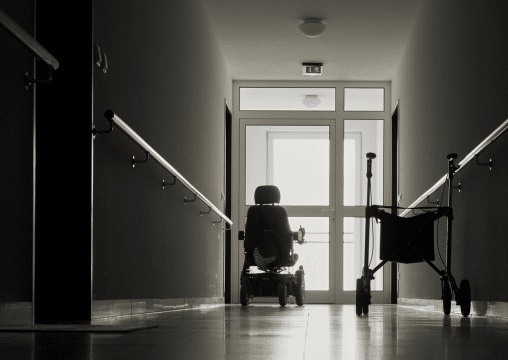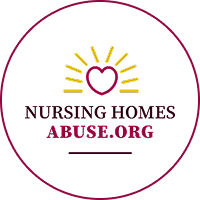- How common is nursing home negligence?
- When can you sue a nursing home for neglect?
- Who can sue for nursing home neglect?
- Evidence Needed To Sue a Nursing Home
- Types of Compensation Available
- How much can you get for a nursing home negligence case?
- How To File a Nursing Home Negligence Lawsuit
- Why You Need a Nursing Home Abuse Attorney
You may wonder what your legal options are when a family member residing in a nursing home has experienced harm. Under certain circumstances, it is possible to sue a nursing home for negligence. Anytime you suspect negligence or abuse, contact Nursing Homes Abuse to discuss your situation and get the legal help you and your family need.
You can sue a nursing home for neglect in certain cases. Pursuing a nursing home negligence lawsuit may be your best course of action when your loved one has suffered harm from nursing home staff’s action or inaction.
Unfortunately, neglect is more common in our country’s senior care facilities than you might think. You need assurance that your family member receives care from compassionate, capable professionals when you can’t be there.
When you suspect negligence at a nursing home, you may not understand your family member’s legal rights and the steps you can take to get compensation for what they have gone through. The team at Nursing Homes Abuse is here to help you understand when you have a negligence case and how to pursue legal action.
How common is nursing home negligence?
According to the National Center on Elder Abuse, neglect in nursing homes occurs when someone refuses or fails to meet their obligations to provide proper care for a resident.
In a survey of long-term care facility residents, 95 percent claimed they suffered neglect or witnessed the neglect of another resident. Because these occurrences are unfortunately so common, each state has enacted laws aimed at elder abuse and neglect.
When can you sue a nursing home for neglect?
Nursing home negligence usually involves unintentional conduct. For example, nursing home staff may have inadvertently failed to provide the necessary level of care, or the facility may have failed to meet safety standards. There could be communication issues in the nursing home, or they may not have adequate staff to care for patients properly. These situations could all lead to neglect.
Sometimes, nursing home neglect may lead to a family member’s death. Some state laws allow a resident’s family to file a wrongful death lawsuit on their behalf.
How do you know when negligence has occurred? Here are some common warning signs:
- Dehydration
- Malnutrition
- Bed sores
- Bruises, welts, cuts, open wounds, fractures, sprains, or other indications of physical abuse
- not have adequate staff to care for patients
- Unsafe living conditions, such as lack of running water
- Unclean living conditions
- Reports of mistreatment
Anytime you notice these warning signs, you may be dealing with nursing home negligence. Talk to a nursing home abuse attorney to discuss the evidence and how to take action to help your loved one.
Who can sue for nursing home neglect?
The following individuals may sue a nursing home for negligence:
- Nursing home resident
- The resident’s agent under a power of attorney
- Immediate family and relatives
Each situation is different when considering a negligent lawsuit against a nursing home. A nursing home abuse lawyer can help you understand your legal options, navigate this stressful time, and get your loved one the help they deserve.
Evidence Needed To Sue a Nursing Home
To prove your case against a nursing home, you must show that:
- The nursing home owed the injured resident a duty of care
- The nursing home breached that duty
- The nursing home’s breach of that duty caused the resident’s injury.
Once you decide to pursue a negligence lawsuit against a nursing home, you must gather evidence to prove these elements.
Among the types of evidence relevant in nursing home negligence suits are the following:
- Care logs
- The facilities operating procedures, training manuals, shift schedules, and hiring practice documentation
- Any incident reports and documentation from the facility
- Medical records from physicians
- Surveillance footage
- Photographs of signs of neglect, such as bedsores or bruises
- Witness accounts
- Expert witness opinions
As soon as you suspect negligence, start documenting everything to support your case. Also, take note of the date when you first discovered the negligence and gather any documentation supporting that determination. This information is important when establishing your deadline for filing a lawsuit.
Working with an attorney ensures you are covering all your bases and are taking all necessary steps to create and win your negligence case.
Types of Compensation Available
Different types of compensation are available to your family member or their estate in a nursing home neglect case. Here are the main forms of compensation they can typically recover through litigation:
- An economic damages award to cover any financial losses
- Medical expenses resulting from the negligence
- Pain and suffering experienced by your loved one because of neglect
- Attorney fees
- Future health expenses for any disability caused by the negligence
- Funeral expenses
How much can you get for a nursing home negligence case?
If you win your case, your loved one will be compensated for what they have gone through. Payouts vary widely depending on the extent of the harm done and the particulars of the case. Settlements for nursing home abuse or neglect lawsuits can range from thousands to millions of dollars.
A nursing home abuse attorney can help you learn more about potential compensation given your family member’s particular nursing home neglect situation. While money will never take away the harm your family member experienced, legal compensation may help your family pay for damages and obtain peace of mind.
How To File a Nursing Home Negligence Lawsuit
Once you suspect negligence has occurred, what do you do next to sue a nursing home for negligence? Here is a step-by-step look at how to file a lawsuit:
1. Act Promptly and Gather Evidence
There is a statute of limitations to file a lawsuit against a nursing home. Timing will vary based on the factors of your case and your state’s laws, but you generally have one to three years to file a case after the injury date or when you were reasonably aware of the abuse or neglect.
You should also gather evidence of nursing home neglect, such as photos of your family member’s injuries or poor living conditions. It is important to act quickly to preserve evidence. Some evidence may be lost, destroyed, or tampered with unless you take action to preserve it. In addition, witnesses may forget or change their stories. A nursing home abuse lawyer can take the proper steps to ensure the evidence remains protected and untainted.
2. Contact an Attorney
If you suspect nursing home negligence, contacting an attorney as soon as possible is important. Acting promptly may help address the problem at the nursing home as soon as possible and help you obtain maximum compensation if you pursue a claim. An attorney will help you understand your rights and how the legal process works while building a solid case for your family member.
3. Report the Negligence or Abuse
You should also report the problem to the nursing home administration. Alerting them may help resolve the issue more quickly. However, note that the facility may not have the proper resources for reporting or may fail to deal with the issue.
You should also report the issue to your state’s nursing home regulation agency and the local police department. Importantly, filing these reports will help create a necessary paper trail that could prove significant in litigation.
4. File a Lawsuit
To proceed with suing a nursing home for negligence, you will need to gather all information and evidence related to your case. Your attorney will file the lawsuit on your behalf and ensure the proceedings are fair and just. The nursing home will then respond or risk losing the case.
Why You Need a Nursing Home Abuse Attorney
Nursing home abuse and negligence cases are emotional, stressful, and overwhelming for everyone involved. You want the best outcome for your loved one so they will never have to be put in harm’s way again. Luckily, you can get support to prove that neglect of your family member happened at the hands of nursing home staff.
Contact the team at Nursing Homes Abuse for legal help today and get justice for your loved one.


